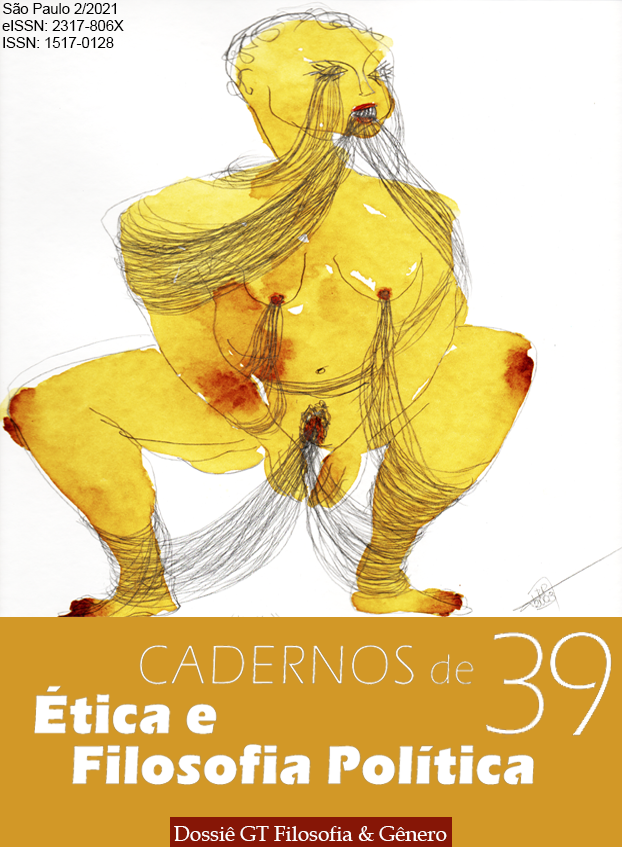Proving something does not mean to convince the public: lessons from ‘feminist’ thinking of the 17th century
DOI:
https://doi.org/10.11606/issn.1517-0128.v39i2p190-202Keywords:
Feminist Philosophy, Querelle des Femmes, Gender EqualityAbstract
The following article presents some of the reflections of the decolonial feminist philosopher Elsa Dorlin on what she called logical-feminism in the voice of four 17th century philosophers: Marie de Gournay, Anna Maria Van Schurman, François Poullain de la Barre and Gabrielle Suchon. In this article, this kind of philosophy is classified as logical-egalitarian and I add a fifth philosopher to the group: Mary Astell. These philosophers defended equality between men and women using logical arguments that sought to demonstrate equality as something true and irrefutable. It is also my intention to present to the Brazilian audience some of the strategies used by these philosophers in the midst of the debate on inequality or equality between the sexes, pointed out by Dorlin. Finally, i'll focus on the reasons why the arguments used did not reach their objective: a context of corrupt judgments and judges.
Downloads
References
AKKERMAN, Tjitske e STUURNAM, Siep. Perspectives on Feminist Political Thought in European History: From the Middle Ages to the Present. London: Routledge, 1998.
ASTEL, Mary. A Serious Proposal to the Ladies, part I, 1694. New York: St Martin's Press, 1986.
ASTEL, Mary. A Serious Proposal to the Ladies, part II, 1697. Londres: Pickering & Chatto, 1997.
ATACK, Margaret. “Writing from the center: Ironies of otherness and marginality”. In: EVANS, R. Simone de Beauvoir's The Second Sex: New Interdisciplinary Essays. Manchester University Press, 1998, pp. 31-58.
BROAD, Jacqueline. The Philosophy of Mary Astell: An Early Modern Theory of Virtue. Oxford University Press, 2015.
CONLEY, John J. “Marie Le Jars de Gournay (1565-1645)”. Internet Encyclopedia of Philosophy. s/d. Disponível em: . Acessado em junho de 2020.
DESNAIN, Véronique. “Gabrielle Suchon: a dangerous philosopher”. Dangerous Women project, 2017. Disponível em: <http://dangerouswomenproject.org/2017/01/20/4354/>. Acesso: junho de 2020.
DESLAURIERS, Marguerite. “Marie de Gournay and Aristotle on the Unity of the Sexes”. In: O’NEILL, E. e LASCANO, M. P. Feminist History of Philosophy. The Recovery and Evaluation of Women's Philosophical Thought. Springer International Publishing, 2019.
DETLEFSEN, Karen. “Custom, Freedom, and Equality”. In: SOWALL, Alice e WEISS, Penny A. Feminist Interpretations of Mary Astell. Pennsylvania State University Press, 2016.
DORLIN, Elsa. L'évidence de l'égalité des sexes. Une philosophie oubliée du XVIIe siècle. Paris: L’Harmattan, 2000.
FRAISSE, Geneviève. La sexuation du monde: réflexions sur l'émancipation. Paris: Les Presses, 2016.
GOURNAY, Marie le Jars de. Egalité des hommes et des femmes; Grief des dames; suivis du Proumenoir de Monsieur de Montaigne. Genebra: Librarie Droz, 1993.
KELLY, Joan. “Early Feminist Theory and the Querelle des Femmes: 1400–1789”. In: Women, History, Theory: The Essays of Joan Kelly. Chicago: University of Chicago Press, pp. 65-109, 1988.
MESQUITA, Cinelli Tardioli. “A Queixa das Damas”. In: Revista Pasmas, maio de 2019. Disponível em: <https://medium.com/pasmas/a-queixa-das-damas-7d285f5dc15>. Acesso: junho de 2020.
POULLAIN de la BARRE, François. De l'Egalité des deux sexes. Discours physique et moral où l ónt voit l'importance de se défaire des préjugez. Paris: Du Puis, 1673.
POULLAIN de la BARRE, François. Three Cartesian Feminist Treatises. Introductions and annotations by Marcelle Maistre Welch. Translation by Vivien Bosley. Chicago & London: The University of Chicago Press, 2002.
RANG, Brita. “A ‘learned wave’: women of letters and science from the Renaissance to the Enlightenment”. In: AKKERMAN, T. e STUURMAN, S. (eds.). Perspectives on Feminist political Thought in European History. Londres: Routledge, 1998.
ROVERE, Maxime. Arqueofeminismo: Mulheres Filósofas e Filósofos Feministas, sec. XVII-XIII. São Paulo: N-1 Edições, 2019.
SHAPIRO, Lisa. “Gabrielle Suchon’s ‘Neutralist’. The Status of Women and the Invention of Autonomy”. In: BROAD, J. e DETLEFSEN, K. Women and Liberty, 1600-1800: Philosophical Essays. Oxford University Press, 2017.
SOLTERER, Helen. The Master and Minerva. Disputing Women in French Medieval Culture. University of California Press, 1995.
SUCHON, Gabrielle. Traité de la morale et de la politique. Lyon: B. Vignieu, 1693.
ZERO HORA. “Confira a entrevista dada por Bolsonaro em 2014, citada pelo candidato no Jornal Nacional”. GZH eleições 2020. 04/08/2018. Disponível em: <https://gauchazh.clicrbs.com.br/politica/eleicoes/noticia/2018/08/confira-a-entrevista-dada-por-bolsonaro-em-2014-citada-pelo-candidato-no-jornal-nacional-cjkfdf5op00ns01muzcwifyo8.html> Acesso: 21 de abril de 2021.
ZIMERMMANN, Margarete. “Querelle des Femmes, querelles du livre”. In: COURCELLES, D. e JULIÁN, C. V. Des Femmes e des Livres. France et Espagne, XIVe – XVIIe siècle. Paris: École Nationale des Chartes, pp. 79-94, 1998.
ZIRBEL, Ilze. “O problema do padrão duplo de cidadania das teorias políticas modernas”. In: Psicanálise e Gênero. São Paulo: ANPOF, pp. 106-127, 2017.
Downloads
Published
Issue
Section
License
Copyright (c) 2021 Ilze Zirbel

This work is licensed under a Creative Commons Attribution-ShareAlike 4.0 International License.


